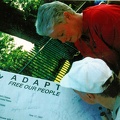NATIONAL ASSOCIATION FOR HOME CARE
228 Seventh Street, SE
Washington, DC 20003
202/547-7424, 202/547-3540 fax
MARY SUMER
CHAIRMAN OF THE BOARD
VAL J. HALAMANDARLS
PRESIDENT
HONORABLE FRANK E. MOSS
SENIOR COUNSEL
STANLEY M. BRAND
GENERAL COUNSEL
MEMORANDUM
June 15, 1997
TO: Members of American Disabled for Attendant Programs Today (ADAPT)
FROM: Val J. Halamandari Mary Suther, Chair .
On behalf of the National Association for Home Care (NAHC), we want to thank you for coming to our offices to bring to our attention issues of critical importance to ADAPT. Together, I am confident that we can address these issues which reflect our mutual concern for those who rely on home and community based services. Our commitment to the consumer is underscored in the opening lines of our mission statement that has been in place since the founding of the organization in 1982:
NAHC is a professional association representing the interests of Americans who need home care (including acute, long term, and terminal care) and the caregivers who provide them with in-home health and supportive services.
We have made many efforts to ensure a productive relationship between people with disabilities, their families, caregivers and the home care community.
NAHC sits on the steering committee of the National Institute on Consumer Directed Care, sponsored by the National Council on Aging, to foster better collaboration on these issues. We were pleased to cosponsor, with a number of organizations (including the World Institute on Disability, NCOA, and several nursing organizations) a symposium on consumer-directed long term care services. We welcome the opportunity to work with you to make public policy more responsive to the needs of people with disabilities.
We included advocates for people with disabilities at our conference on home care aide issues in the spring. We would welcome the opportunity to have a presentation by ADAPT members at the 16th Annual Meeting of the National Association for Home Care. The meeting will be held in Boston, October 17-22, 1997. We will work together to determine the best possible time.
NAHC supports the right of consumers to choose the type of care and the caregiver that best suits their needs. We believe that federal policy and regulations should never become so cumbersome as to pose barriers to consumers accessing essential care.
We believe consumers have the right to self-direct their care or choose administration of care by an agency without diminishing quality or quantity of care received. Consumers should be permitted to receive services through a combination of service delivery modes. However, at the same time, NAHC believes that both the consumer and the caregiver have rights. This includes a caregiver's right to compliance with applicable state and federal labor health and safety laws and regulations. It is incumbent on our organizations to make certain that these laws do not create barriers, but maintain the ability to protect caregivers.
Home care and ADAPT have much in common. While we cannot direct the actions of our state affiliates, we will encourage our state home care associations to meet with local ADAPT groups on ways to create consumer driven attendant services.
NAHC has consistently endorsed the following CASA principles, including those which would:
* empower consumers with maximum control to select, manage, and control their attendant services,
* maintain emphasis on community-based, not institutional care,
* base eligibility on functional need, regardless of age and/or disability,
* ensure that needed services are available 24 hours a day, 7 days a week,
* ensure that needed back-up and emergency services are available,
* authorize programs that allow for the development of options, such as vouchers; direct case payments to individual providers, and consumer directed agency models, with appropriate standards and safeguards to ensure quality of care,
* ensure the appropriate delegation of health related tasks, make available voluntary training for consumers,
* ensure that personal attendants receive livable wages and benefits, and
* base attendant services on agreed-upon individualized service plans.
NAHC has longstanding concerns about the imposition of home care copays due to their regressivity and likelihood of creating barriers to needed home care. Certainly, though, creative ideas need to be developed that would allow individuals with disabilities who are not currently eligible for Medicare or Medicaid to more fully access these vital programs. In addition, NAHC believes that individuals in need of home health services should be entitled to the same high quality and standards of care, regardless of their levels of income or source of public funding for their care.
NAHC believes that every effort must be made to avoid unnecessary institutionalization. The National Association for Home Care is proud of our advocacy of home and community based alternatives to institutionalization. NANC's visibility and credibility on Capitol Hill, with the White House, and throughout the Nation, is linked to its name. Our name will remain the same. Our commitment to ensuring that "home care" is accessible, responsive to consumer needs, and encompasses more than "medically related" services, will continue.
NAHC is already in on-going discussions with a number of beneficiary and disability groups on ways to have home care more available and tailored to individuals with chronic care needs. We look forward to including ADAPT members in these discussions, and including in our discussions the importance of developing transition plans for people with disabilities coming out of institutions.
Thank you again for the opportunity to enter into a more direct dialogue with you on these important issues. We look forward to working toward enactment of these goals and principles.
- Created on
- Tuesday 16 July 2013
- Posted on
- Thursday 26 September 2019
- Visits
- 295
- Rating score
- no rate
- Rate this photo


0 comments